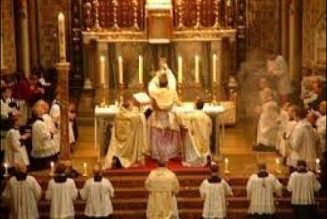
There is currently considerable discussion about whether it is possible to bless persons in same-sex unions. In light of this, it can be useful to step back and take a look at the topic of blessings in general.
Here are 7 things to know and share about blessings.
1) What are blessings?
The English word bless is used to translate the Latin word benedicere and the Greek word eulogein. Both of these mean “to speak good.”
In Scripture, the terms have a variety of uses. For example, one may bless God by speaking good of God — i.e., praising him (Psalm 68:26, James 3:9, etc.).
However, another prominent use of the term is speaking good about something other than God in hopes of bringing about good effects. Thus the patriarch Isaac intended to bless his son Esau to bring good things upon him, but through Rebekah’s intervention, this blessing was stolen by Jacob (Genesis 27).
To bless is the opposite of to curse (Latin, malidicere, “to speak evil”). When a person curses something, he speaks evil about it in order to bring about evil or bad effects. Thus the Moabite king Balak sought to have the prophet Balaam curse Israel to harm the nation, but through God’s intervention, the curse was turned into a blessing (Numbers 22-24).
Blessings and curses of this type are sometimes called invocative because they invoke either good or evil upon the person or thing.
Whether the blessing or curse ultimately achieves its effect depends on the will of God, who is the one being invoked and asked to help or harm someone.
Another kind of blessing has developed which involves permanently changing the status of someone or something by setting it apart for a holy purpose. This type of blessing is sometimes called constitutive because it constitutes the person or thing in its new, holy status. This form of blessing is also sometimes referred to as a consecration.
The Catechism of the Catholic Church states:
Certain blessings have a lasting importance because they consecrate persons to God, or reserve objects and places for liturgical use.
Among those blessings which are intended for persons — not to be confused with sacramental ordination — are the blessing of the abbot or abbess of a monastery, the consecration of virgins and widows, the rite of religious profession, and the blessing of certain ministries of the Church (readers, acolytes, catechists, etc.).
The dedication or blessing of a church or an altar, the blessing of holy oils, vessels, and vestments, bells, etc., can be mentioned as examples of blessings that concern objects (CCC 1672).
2) What can be blessed?
A wide variety of people and things can be blessed. The Catechism specifically mentions persons, meals, objects and places (CCC 1671).
3) Who are the parties involved in a blessing?
There are several parties that can be involved in a blessing. They include:
- The person being blessed (or those that are helped by a blessed object or thing)
- The person who performs the blessing
- The Church, which has authorized some blessings to be given in its name
- God, who is the ultimate source of all blessing (James 1:17)
The Church is not involved in all blessings but only those it has authorized. These may be considered official blessings. They involve the intercession of the Church, as expressed through the authorized person performing the blessing.
Other blessings — such as those performed by ordinary people (e.g., when we say “God bless you” to someone) — may be considered unofficial.
4) Do blessings take effect automatically?
The standard answer is no, but careful reflection suggests that the answer is more complex than that.
In the case of constitutive blessings — such as the blessing of an abbot or abbess or the blessing of a church or an altar — the answer would appear to be yes.
If the Church’s official rite of blessing has been used for an abbot or abbess, that person really has been consecrated or set aside for a holy office, even if the man or woman is personally unworthy. Similarly, if a church or altar has been consecrated, it really has been set apart for sacred use.
When it comes to invocative blessings, the matter is different. Blessings are not sacraments but sacramentals. In fact, the Catechism notes, “Among sacramentals blessings … come first” (CCC 1671).
Sacraments are rites instituted by Jesus that God has promised to use to distribute his grace — especially sanctifying grace — so long as the recipient does not put a barrier in the way of receiving it. For example, in every reception of Holy Communion, grace is present for those who receive in the state of grace. The same is true for the sacrament of matrimony — grace is present to the spouses who open their lives to God’s design for marriage.
Sacramentals are rites instituted by the Church, and so God has not promised to distribute his grace on each and every occasion that they are performed. The 1907 Catholic Encyclopedia states:
Blessings are not sacraments; they are not of divine institution; they do not confer sanctifying grace; and they do not produce their effects in virtue of the rite itself, or ex opere operato. They are sacramentals.
Similarly, the Catechism states:
Sacramentals do not confer the grace of the Holy Spirit in the way that the sacraments do, but by the Church’s prayer, they prepare us to receive grace and dispose us to cooperate with it (CCC 1670).
In general, whether an invocative blessing has its intended effect will depend on the piety of the one receiving the blessing and whether it is God’s will for the person to receive the intended good.
5) What effects do blessings have?
The Catholic Encyclopedia states:
They produce the following specific effects: (1) Excitation of pious emotions and affections of the heart and, by means of these, remission of venial sin and of the temporal punishment due to it; (2) freedom from power of evil spirits; (3) preservation and restoration of bodily health. (4) various other benefits, temporal or spiritual. All these effects are not necessarily inherent in any one blessing; some are caused by one formula, and others by another, according to the intentions of the Church.
The particular effects that a blessing involves will depend on the words used in the blessing — i.e., what does the blessing ask God to do?
One should consult The Book of Blessings for the words used in official blessings.
6) Who can perform blessings?
There has long been an association between blessings and the priesthood. Thus Numbers 6:22-27 states:
The Lord spoke to Moses, saying, Speak to Aaron and his sons, saying, Thus you shall bless the people of Israel: you shall say to them, ‘The Lord bless you and keep you; the Lord make his face to shine upon you and be gracious to you; the Lord lift up his countenance upon you and give you peace.’ So shall they put my name upon the people of Israel, and I will bless them.
However, blessings were not restricted to priests. In the Old Testament, the patriarchs gave blessings to their children, and various prophets (including Balaam) pronounced blessings also.
Also, Israel — like the Church — was called to be “a kingdom of priests” (Exodus 19:6, Revelation 1:6; cf. 1 Peter 2:9). As a result, there are situations in which the laity also can give blessings. The Catechism explains:
Sacramentals derive from the baptismal priesthood: every baptized person is called to be a ‘blessing,’ and to bless.
Hence lay people may preside at certain blessings; the more a blessing concerns ecclesial and sacramental life, the more is its administration reserved to the ordained ministry (bishops, priests, or deacons) (CCC 1669).
The Church’s Book of Blessings notes who can perform which individual blessings. Sometimes this will be the bishop, sometimes a priest, sometimes a deacon, sometimes a layperson, and sometimes a combination of these.
Among others, the laity are authorized to perform the blessing of an Advent wreath, a Christmas manger or Nativity scene, a Christmas tree, and throats on St. Blaise’s Day (Feb. 3). They also are authorized to help with the distribution of ashes on Ash Wednesday, though the blessing of the ashes is reserved to a priest or deacon.
There are no limits to who may perform unofficial blessings. Any person can bless a meal, bless his children or say “God bless you” to another.
7) Where can I learn more?
The single most authoritative source on blessings is the Church’s Book of Blessings. It contains not only the texts used for individual, official blessings, it also contains introductions to the individual texts, as well as a general introduction to the subject of blessings.
Also helpful is Father Stephen J. Rossetti’s book The Priestly Blessing: Recovering the Gift. It contains a discussion of the history of blessings in light of Church teaching and the opinions of theologians.









